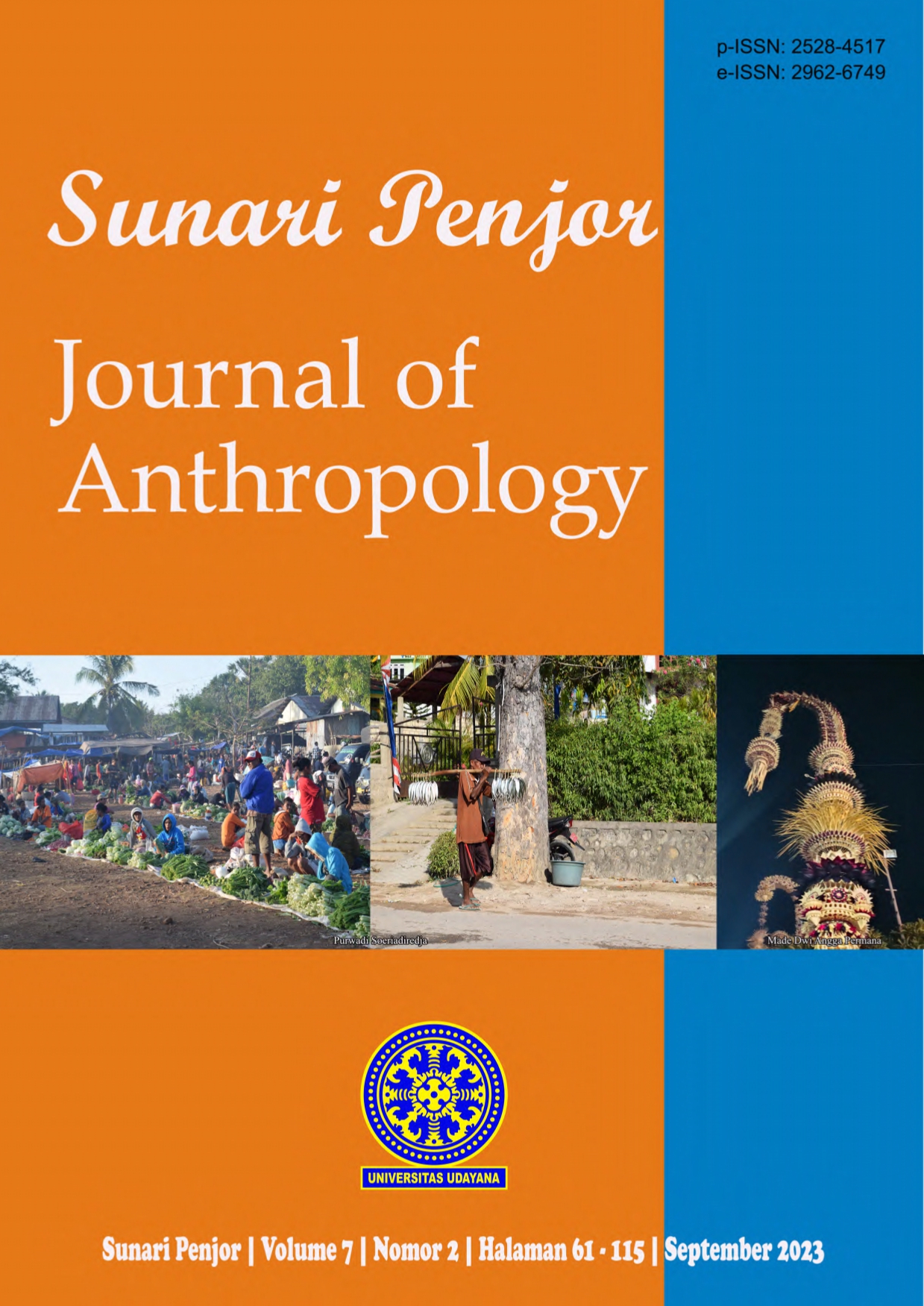Mengungkap Kehidupan Ende Pasar Sotor dalam Lingkungan Keluarga
Abstract
Ende are one of the merchant communities in Sotor Market, Ketang Village, Manggarai Regency, East Nusa Tenggara Province. In everyday life Ende has a dual role, namely a domestic role and a public role. The involvement of women in the public sphere aims to help husbands increase economic family. So on this basis the research was conducted to find out how the role of women traders in the domestic sphere and in the public sphere. The method used in this study is a qualitative method with an ethnographic research model through observation, interviews, and literature studies. The theory used is Role theory (Pujiwati Sajogyo) and Socialist Feminism theory (Friederich Engels). Based on the results of the research analysis, Ende's role in the domestic sphere is to act as a wife to her husband, a mother to her children, and a grandmother to her grandchildren. While in the public sphere Ende acts as a breadwinner and as a member of the community. Women traders by carrying out these two dual roles have implications for both the family and the community.
Downloads
References
Engels, F. (1972). The Origin of the Family, Private Property and the states. Internasional Publishers.
Fadlianti, N. (2019). “Peran Perempuan Buruh Tani Merica Dalam Meningkatkan Ekonomi Keluarga Di Desa Wawondula Kecamatan Towuti Kabupaten Luwu Timur”. Jurnal Penelitian Budaya, 2(2).
Ihromi, T.O. (1995). Kajian Wanita dalam Pembangunan. Yayasan Obor Indonesia.
Kauntu, R.R., dan Suraya, R.S. (2018). “Perempuan Pemulung Dalam Mendukung Ekonomi Keluarga Di Pesisir Teluk Kendari”. ETNOREFLIKA, 7(3), pp. 212-221. https://doi.org/10.33772/etnoreflika.v7i3.553
Miles, M.B., dan Huberman, A.M. (2005). Qualitative Data Analysis (terjemahan). UI Press.
Mosse, J.C. (1986). Gender dan Pembangunan. Pustaka Pelajar Offest.
Nggoro, A.M. (2016). Budaya Manggarai Selayang Pandang. Nusa Indah.
Norma., Taena, L., dan Basri, L.O.A. (2019). Keterlibatan Perempuan Dalam Sektor Publik Untuk Peningkatan Pendapatan (Studi Pada perempuan Penjual Sayur Di Pasar Pelelangan Kota Kendari). Jurnal Penelitian Budaya, 4(2), pp. 75-83. http://dx.doi.org/10.33772/jpeb.v4i2.9074
Oey, M. (1998). Wanita dan sektor Formal, dalam Galang Seri Sektor Formal. Lembaga Studi Pembangunan.
Parawansa, K.I. (2006). Mengukur Paradigma Menembus Tradisi: Pemikiran Tentang Keserasian Jender. LP3ES.
Sajogyo dan Pujiwati. (2005). Sososlogi pedesaan. Gadjah Mada University Press.
Saptari, R., dan Holzer, B. (1997). Perempuan, Kerja, dan Perubahan Sosial. Pustaka Utama Grafiti.
Soekanto, S. (2004). Sosologi Suatu Pengantar. Rajawali.
Sukari. (2013). “Peranan Perempuan dalam Rumah Tangga Nelayan: Kasus di Desa Branta Pesisir, Tlanakan, Pemekasan Madura”. Patrawiya, 14(2), pp. 275-300.
Sukesi, K. (1991). Status dan Peranan Perempuan: Apa Implikasinya Bagi Studi Perempuan, dalam Warta Studi Perempuan. Jurnal Penelitian Budaya, 2(1).














